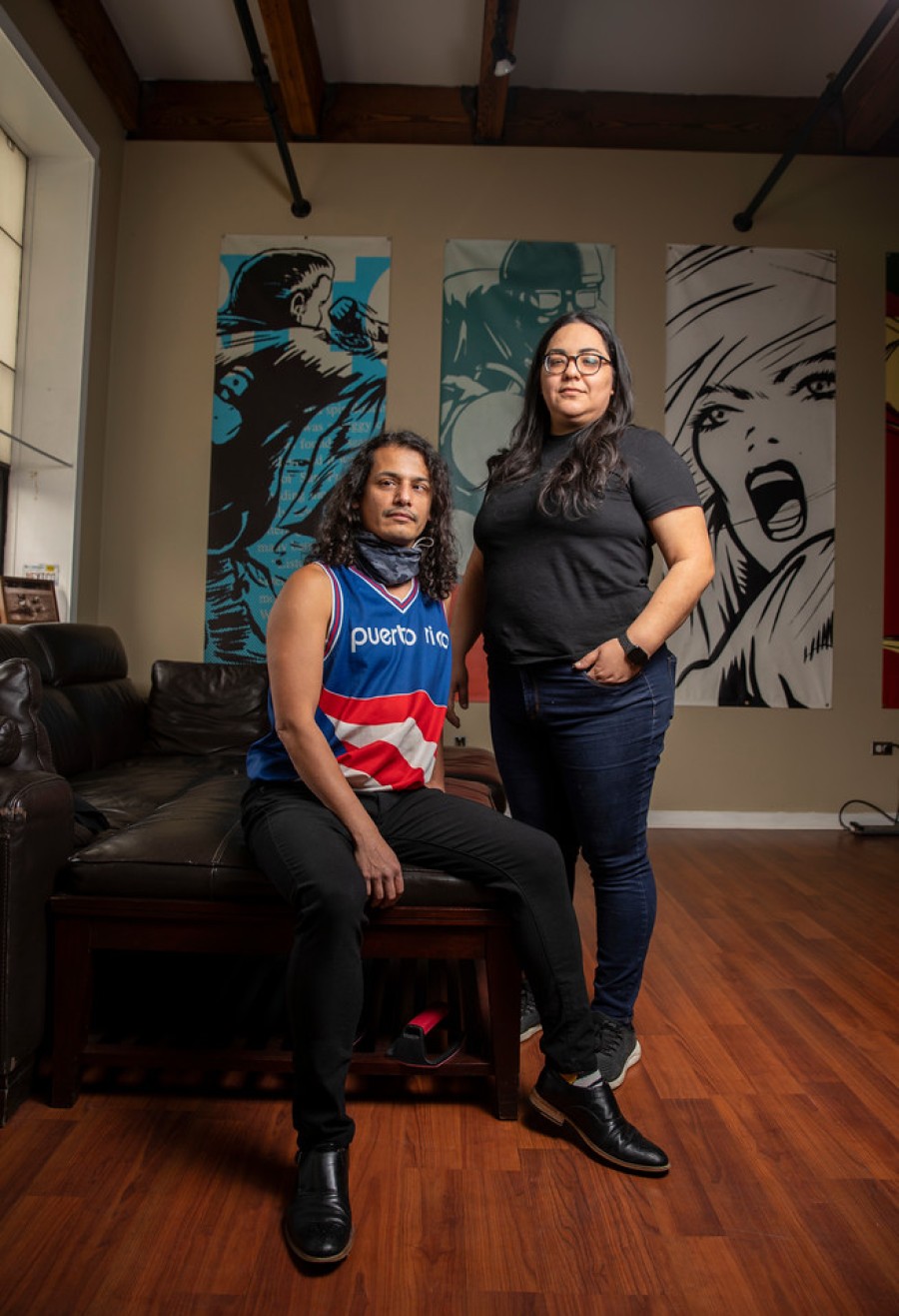Volunteers Help Chicago Residents Without Internet Connect To COVID-19 Vaccines
By María Inés Zamudio

Volunteers Help Chicago Residents Without Internet Connect To COVID-19 Vaccines
By María Inés ZamudioThis story is supported by the Pulitzer Center.
Anna Lopez is juggling two phones and her computer as she’s trying to book another appointment for the COVID-19 vaccine.
Lopez is helping a 45-year-old manufacturing worker. The woman needs help booking the appointment online. Lopez wasn’t able to find an appointment during the call. But Lopez vowed to scour the internet until she finds the woman an appointment.
“Thank you so much for helping me,” the woman told Lopez in Spanish.
Lopez is studying computer science at the University of Illinois at Chicago. She knows that by making the vaccine appointments available primarily online, the city may be leaving many Chicagoans out. That’s why she created “Vaccinate Abuela Chicago,” a volunteer group on Facebook aimed at helping individuals from Chicago’s Black and brown communities book vaccine appointments online.
Many Chicagoans don’t have access to the internet at home. In communities like North Lawndale and Englewood, almost half of the households don’t have an internet subscription. This digital divide has real-life consequences — especially when getting the COVID-19 vaccine depends on one’s ability to book an appointment online.
“If we counted on the government to get us the vaccine when we need it — and in the right place when we need it, too — we wouldn’t have to worry so much about people from the suburbs coming into the city and getting the appointments from the at-risk community,” she said.

That’s exactly what happened earlier this month at the United Center. It became the biggest mass vaccination site in Chicago, but people had to sign up online for a spot. The system created an uneven playing field, because many residents in communities on Chicago’s South and West sides don’t have internet at home. In Chicago’s Englewood community, for example, 43% of the households don’t have internet subscriptions. In the Lake View community, by contrast, only 9% of the households lack an internet subscription, according to a WBEZ analysis of data spanning 2015-2019 from the U.S. Census Bureau.
That divide is among the factors contributing to the gap in vaccinations received by members of those two communities. A WBEZ analysis of city vaccination data as of March 17 shows that less than 16% of adults in the 60621 ZIP code, which encompasses much of Englewood, have received at least a first dose of the COVID-19 vaccine — whereas about 27% of adults have received at least a first dose in the 60613 and 60657 ZIP codes, which make up the bulk of Lakeview.
When it comes to booking appointments online connectivity matters.
“The city has also provided those without internet the ability to schedule appointments over the phone via a multi-lingual hotline and homebound persons the option of having [the Chicago Fire Department] help them via the Mobile Vaccination Program,” a city spokesperson said in a statement.
Esteban Andres Cruz is helping their friend, Lopez, to book appointments online. They said inequality was built into this process.
“When the states decided they were going to make it more convenient for seniors by putting these appointments available online, it just seemed like it baffled both of us because a lot of seniors especially Black and Brown seniors do not have access to good wifi let alone a laptop,” Cruz said.
While both state and city officials say they are committed to an equitable distribution of the vaccine, early numbers show that communities of color are lagging behind. As of March 17, roughly 25.9% of adult white Chicagoans had received at least the first dose of a COVID-19 vaccine, compared with 22.5%, 22.1% and 18.0% for adult Latino, Asian and Black Chicagoans, respectively, according to a WBEZ analysis of city vaccination data.

Lopez said she started helping other people book appointments after she found vaccines for her parents. She said helping her community is just part of who she is.
“I grew up with immigrant parents, and it’s always been this thing that we do as children of immigrants to look into things for our parents and to find resources for them whenever we can,” she said.
Cruz said they, too, feel that sense of responsibility. They said it has been difficult to see Chicagoans from neighborhoods hardest hit by the pandemic struggle to find appointments online.
Last week, Cruz helped a 69-year-old Black woman book a vaccine appointment. Cruz patiently asked the woman questions and helped her book an appointment close to her home, because she didn’t have anyone to take her.
“I see there’s one just off of 87th, a Walgreens,” Cruz said.
They wait for her response. “Yeah? OK. Good. Good. They do have appointments,” Cruz said.
Before ending the call, Cruz tells the woman to send more seniors their way.
“If you do have anybody else, seniors, in Black and brown communities, we would love to hear from them,” Cruz said. “Go ahead and give them my number.”
María Inés Zamudio is a reporter for WBEZ’s Race, Class and Communities desk. Follow her @mizamudio.